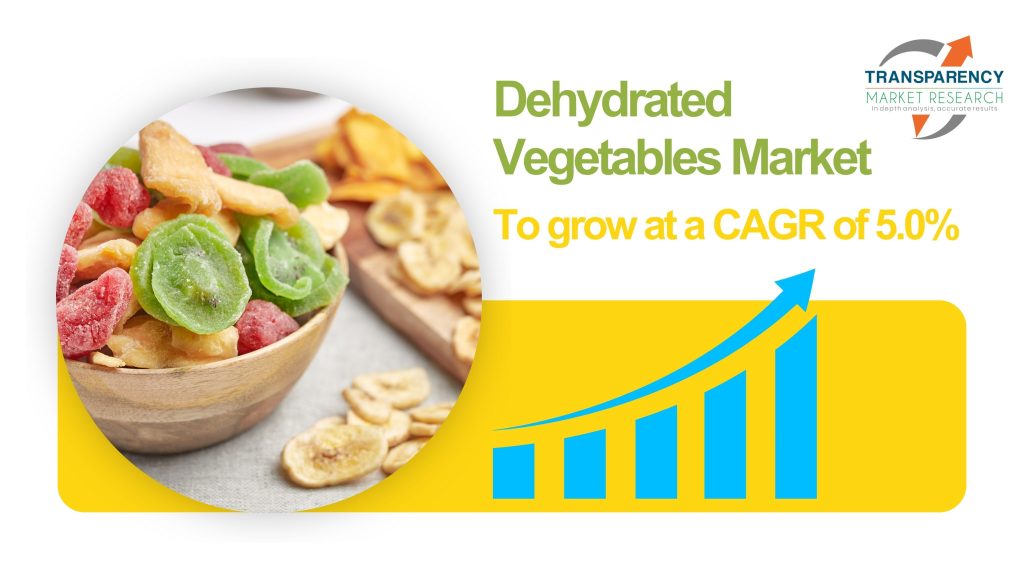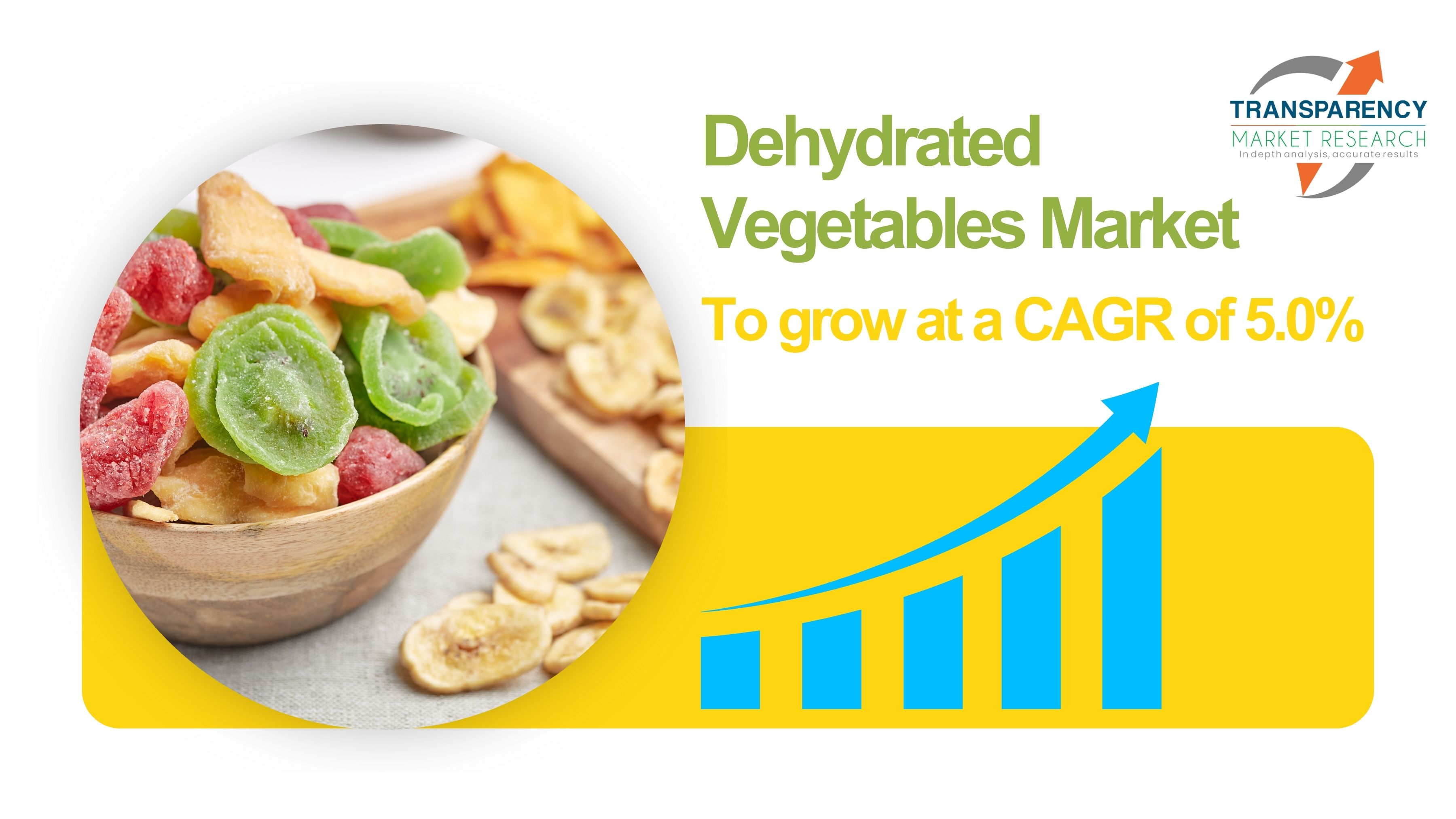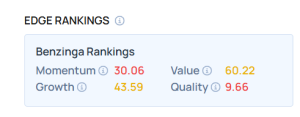
Wilmington, Delaware, Transparency Market Research Inc. –, Jan. 24, 2025 (GLOBE NEWSWIRE) — The global dehydrated vegetables market (脱水野菜市場)is experiencing significant expansion as consumer preferences shift toward more convenient and sustainable food options. Valued at $69.6 billion in 2022, the market is projected to grow at a CAGR of 5.0% from 2023 to 2031, reaching $107.8 billion by the end of the forecast period.
The increasing demand for longer shelf-life food products that retain their nutritional value is one of the main driving forces behind this growth. Additionally, the rapid urbanization, coupled with busy lifestyles and a growing interest in health-conscious eating habits, has led to greater adoption of dehydrated vegetables.
Dehydrated vegetables offer a versatile solution for consumers and food manufacturers alike. They are lightweight, easy to store, and require minimal preparation. This makes them especially popular among households, emergency food suppliers, and foodservice providers who value the extended shelf life and convenience of dehydrated vegetables. With growing environmental concerns over food waste, the industry is also benefiting from a rising preference for sustainable food practices.
Request a Detailed PDF Brochure – https://www.transparencymarketresearch.com/sample/sample.php?flag=S&rep_id=55029

Dehydrated Vegetables Industry Overview
Dehydrated vegetables are made by removing the moisture content from vegetables, either through air drying, freeze drying, or spray drying. This process allows vegetables to be stored for long periods without refrigeration, making them an essential product for the food industry. Despite the loss of some nutrients, such as vitamin C, during the dehydration process, many dehydrated vegetables retain their essential vitamins, minerals, and fiber, making them a nutritious option for consumers.
The market for dehydrated vegetables is expanding globally, driven by the increasing demand for processed, ready-to-cook, and instant food products. These products offer high convenience for consumers who are looking for quick, nutritious meals that do not require extensive preparation. The expanding popularity of home meal kits, as well as the rise of the health and wellness trend, are contributing factors to the growing demand for dehydrated vegetables.
Leading manufacturers in the dehydrated vegetables sector are also focusing on improving the quality of their products through technological advancements. For instance, the use of freeze-drying technology has allowed manufacturers to preserve the texture, color, and flavor of vegetables better than traditional drying methods. These innovations are increasing the appeal of dehydrated vegetables, which were once perceived as lower quality compared to fresh produce.
Get Customized Insights & Analysis for Your Business Needs: https://www.transparencymarketresearch.com/sample/sample.php?flag=S&rep_id=55029
Key Players and Recent Developments
Several key players dominate the dehydrated vegetables market, driving the industry’s growth through innovation, strategic partnerships, and market expansion. These leading companies include:
- Olam International
- Harmony House Foods
- Van Drunen Farms
- Symrise AG
- Mercer Foods
Olam International, for example, has recently increased its focus on plant-based ingredients, expanding its dehydrated vegetable offerings to meet the growing consumer demand for plant-based food options. In addition, the company has invested in sustainable farming practices to ensure that its vegetable sourcing is both eco-friendly and efficient.
Another key player, Van Drunen Farms, has strengthened its position by offering a diverse range of organic and non-GMO dehydrated vegetable products. The company’s commitment to organic farming and clean-label products aligns with the increasing consumer preference for health-conscious and transparent food options.
Big News in the Industry
In recent months, many companies have embraced eco-friendly initiatives. For instance, Harmony House Foods, known for its high-quality dehydrated vegetables, recently launched a major sustainability program aimed at reducing its carbon footprint. The company has committed to adopting solar-powered drying systems in its manufacturing processes, making it a leader in sustainability within the dehydrated foods sector.
Similarly, several companies in the industry have entered strategic partnerships with food processing firms to expand their reach in emerging markets. This has led to the increased availability of dehydrated vegetable products in regions like Asia-Pacific and Latin America, where the demand for convenience foods is rising rapidly.
Market Scope and Growth Prospects
The scope of the dehydrated vegetables market is vast, extending across various applications in the food processing, foodservice, and retail sectors. As more consumers seek nutritious, easy-to-prepare meals, the demand for dehydrated vegetables continues to rise. Retailers are increasingly offering dehydrated vegetable products in convenient packaging, catering to both individual consumers and families.
In the foodservice sector, dehydrated vegetables are being used in ready-to-cook meal kits, soups, stews, sauces, and snack foods. Additionally, the versatility of dehydrated vegetables makes them a popular ingredient in the production of processed foods, such as instant noodles, salads, and dry seasoning mixes.
The growing interest in plant-based and vegetarian diets also contributes to the market’s expansion, as dehydrated vegetables play a significant role in these eating trends.
The rise of emerging economies in Asia-Pacific and Latin America presents a new growth opportunity for the dehydrated vegetables market. In these regions, an expanding middle class, increased urbanization, and changing consumer preferences for convenience foods are driving demand for dehydrated vegetables.
Top Market Trends
Several key trends are shaping the dehydrated vegetables market and driving its growth:
- Sustainability Focus
Dehydrated vegetables are increasingly being recognized for their sustainability benefits. As food waste remains a global challenge, dehydrating surplus vegetables helps to reduce waste while providing consumers with an affordable and nutritious alternative to fresh produce. - Organic and Non-GMO Products
Health-conscious consumers are placing a higher premium on organic and non-GMO products. In response to this demand, dehydrated vegetable manufacturers are offering clean-label products free from artificial additives and preservatives. Organic dehydrated vegetables are growing in popularity as more consumers seek transparency in the food they consume. - Customization for Foodservice and Retail
Companies are developing specialized offerings for the foodservice industry. For example, dehydrated vegetables tailored for use in ready-to-cook meals, snacks, and catering services are increasingly being designed to suit the specific needs of these businesses. Retailers, on the other hand, are offering ready-to-use dehydrated vegetable products in compact packaging for busy consumers who need convenient meal solutions. - Technological Advancements
Advances in dehydration technology, such as freeze-drying and vacuum-drying, are improving the quality of dehydrated vegetables. These methods help preserve the texture, flavor, and nutritional value of vegetables, making them more appealing to a wider consumer base.
Buy This Premium Research Report Now to Get Detailed Analysis: https://www.transparencymarketresearch.com/checkout.php?rep_id=55029<ype=S
The Overall Industry Perspective
The dehydrated vegetables market is a crucial segment of the global food industry. As consumer preferences shift toward healthier, more sustainable food options, the market for dehydrated vegetables is expected to expand significantly. The growth of the market is driven by technological advancements, changing consumer behaviors, and a growing interest in reducing food waste.
The broader food industry is embracing convenience, sustainability, and health-conscious eating habits, which aligns perfectly with the attributes of dehydrated vegetables. Manufacturers are continuing to innovate and diversify their product offerings to meet these evolving consumer demands. The future of the dehydrated vegetables market is bright, and it is set to play a key role in shaping the future of global food consumption.
Explore Latest Research Reports by Transparency Market Research:
- Boswellia Market – (Mercato della Boswellia) is estimated to grow at a CAGR of 4.9% from 2023 to 2031 and reach US$ 152.0 Million by the end of 2031.
- Egg Protein Market – It is estimated to grow at a CAGR of 6.2% from 2023 to 2031 and reach US$ 418.5 Million by the end of 2031.
About Transparency Market Research
Transparency Market Research, a global market research company registered at Wilmington, Delaware, United States, provides custom research and consulting services. Our exclusive blend of quantitative forecasting and trends analysis provides forward-looking insights for thousands of decision makers. Our experienced team of Analysts, Researchers, and Consultants use proprietary data sources and various tools & techniques to gather and analyses information.
Our data repository is continuously updated and revised by a team of research experts, so that it always reflects the latest trends and information. With a broad research and analysis capability, Transparency Market Research employs rigorous primary and secondary research techniques in developing distinctive data sets and research material for business reports.
Contact:
Transparency Market Research Inc.
CORPORATE HEADQUARTER DOWNTOWN,
1000 N. West Street,
Suite 1200, Wilmington, Delaware 19801 USA
Tel: +1-518-618-1030
USA – Canada Toll Free: 866-552-3453
Website: https://www.transparencymarketresearch.com
Email: sales@transparencymarketresearch.com
Follow Us: LinkedIn| Twitter| Blog | YouTube

© 2025 Benzinga.com. Benzinga does not provide investment advice. All rights reserved.


